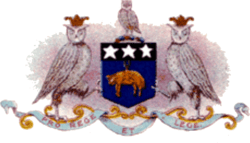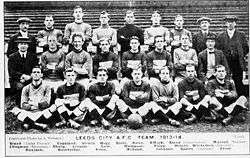Leeds City F.C.
 | |||
| Full name | Leeds City Football Club | ||
|---|---|---|---|
| Nickname(s) | The Peacocks, The Citizens, City | ||
| Founded | 1904, 1924, 2005 | ||
| Dissolved | 1919, 1927 | ||
| Ground |
Adel War Memorial Association Leeds West Yorkshire | ||
| League | West Yorkshire League Premier Division | ||
| 2013–14 | West Yorkshire League Premier Division, 3rd | ||
|
| |||
Leeds City Football Club was the leading professional football club in Leeds, England, before World War I. The club was dissolved in 1919 due to financial irregularities. A new club using the same name was founded in 2005.[1]
History
The club was formed in 1904, taking the crest of Leeds as the club badge[2] and adopting blue, yellow and white as the club's colours.[3] With the demise of the Holbeck Rugby Club, Leeds City moved into Elland Road stadium. They were elected to the Football League in 1905. The original secretary, a role that then also carried the modern responsibilities of manager and coach, was Gilbert Gillies (1904–1908) who was followed by Frank Scott-Walford before in 1912, they appointed Herbert Chapman who guided the club to their highest position in the league (4th in the Second Division).
Leeds City's whole league career was in the Second Division. However during the First World War there ensued a sequence of financial irregularities, including breaking the ban on paying players during the war, that led to the club's dissolution in 1919. They were expelled from The Football League eight games into the 1919–20 season. The harsh punishment was handed down mostly because of the behaviour of the club's directors, who refused to co-operate in an FA inquiry, and refused to hand over the club's financial records.[4]
Port Vale took over their remaining fixtures (as well as their results up to that point).[5] Leeds City remain the only club to be expelled from the League mid-season, and the only ones to be expelled from the League due to financial irregularities (ironically enough their successors, Port Vale nearly lost their League status for similar reasons in 1968, although they ultimately managed to retain it in an end-of-season vote among the other clubs).
In the wake of their demise, Leeds United were formed, and entered the Football League the following year.
Player auction

On 17 October 1919, an auction was held at the Metropole Hotel in Leeds, where the playing staff was auctioned off along with other assets of the club. The 16 members of the playing squad were bought by 9 different clubs for a total of £9,250.[6]
| Player | Destination | Bid |
|---|---|---|
| Billy McLeod | Notts County | £1,250 |
| Harry Millership | Rotherham County | £1,000 |
| John Hampson | Aston Villa | £1,000 |
| Willis Walker | South Shields | £800 |
| Tommy Lamph | Manchester City | £800 |
| John Edmondson | Sheffield Wednesday | £800 |
| William Hopkins | South Shields | £600 |
| George Affleck | Grimsby Town | £500 |
| Ernest Goodwin | Manchester City | £500 |
| Billy Kirton | Aston Villa | £500 |
| William Ashurst | Lincoln City | £500 |
| Fred Linfoot | Lincoln City | £250 |
| Herbert Lounds | Rotherham County | £250 |
| Arthur Wainwright | Grimsby Town | £200 |
| William Short | Hartlepools United | £200 |
| Francis Chipperfield | Lincoln City | £100 |
None of the players auctioned ever played for the new Leeds United, but winger Ivan Sharpe, who had scored 17 goals in 65 appearances for City between 1913 and 1915, spent 2½ years at United between 1920 and 1923 (but only played once) and right-half Harry Sherwin, who left City just 5 months before their dissolution, went on to score twice in 107 games for United between 1921 and 1925.
Revival
1920s
The club did re-form in 1924 as an amateur club, taking part in the Yorkshire Football League. They finished 6th, 4th and 11th in the three seasons they took part. The club however dissolved in 1927.
Current situation
Currently there is a men's senior team under the name of Leeds City which formed in 2006 and plays in the West Yorkshire League. Leeds City were promoted from the West Yorkshire League Second Division as champions of the 2006–07 season, and from the First Division as runners-up in 2007–08. They finished the league as runners-up in 2008–09, 2012–13 and 2014-15; 3rd in 2009–10, 2010–11 and 2013–14 and 7th in 2011–12.
Cup Success - Leeds City have won the West Riding County Challenge Cup in 2011-12 and finished runners-up in 2014-15. City also won the Leeds & District Cup in 2012-13 and finished runners-up in 2014-15. They won the West Yorkshire League Cup in 2014-15 and have finished runners up in the Northern FA National Cup in 2012-13.
There is also a female team using the Leeds City name; Leeds City Vixens L.F.C., a local women's football club. They play in the Northern Combination Women's Football League, 1/4 of the women's third division. Neither the current Leeds City or Leeds City Vixens L.F.C. are recognised as an official continuation of the old club and are in fact only a continuation of the name. Neither club plays in Leeds City's traditional colours either, both playing in white shirts with a shade of blue trim along with shorts and socks in the same shade of blue.
Attendance
City's attendances were among the worst in the league, and the club was never particularly well financed. This is mainly attributed to the area being traditionally a rugby league area. Until the relegation of Luton Town, however, the club were nevertheless, along with Bradford PA, the highest placed former League team in the all time average attendance figures for the Football League & Premier League having an average attendance of 10,234 and a total attendance of 1,944,365 for all matches played.[7]
References
- ↑ http://www.leedscityfc.org/content/view/100/51/
- ↑ "1905–06, Where it all began...". Dave Tomlinson. mightyleeds.co.uk. Retrieved 2006-10-13.
- ↑ "Leeds City". Dave Moor. Historical Kits. August 2006. Retrieved 2006-10-13.
- ↑ What If There Had Been No Port In The Vale?: Startling Port Vale Stories! (Witan Books, 2011, ISBN 978-0-9529152-8-7)
- ↑ Butler, Bryon (1998). 100 Seasons of League Football. England: Queen Anne Press. p. 392. ISBN 1852915951.
- 1 2 "Review of 1919–20 – Disaster strikes". Dave. MightyLeeds.co.uk. Retrieved 2006-11-16.
- ↑ "All Time League Attendance Records". Niall Mackenzie. Newcastle's Unofficial Fans Collaboration. 4 September 2006. Archived from the original on 2006-09-07. Retrieved 2006-09-12.
External links
- Leeds Fans Forum
- The complete Leeds City match statistics from wafll.com
- The Leeds City years – Leeds United Fans Site
- The Leeds City Scandal – Leeds United Fans Site
- Article at FootballSite
- Leeds City at Football Club History Database
- West Yorkshire Association Football League
- Official Leeds City Website
| ||||||||||||||||||||||||||
| ||||||